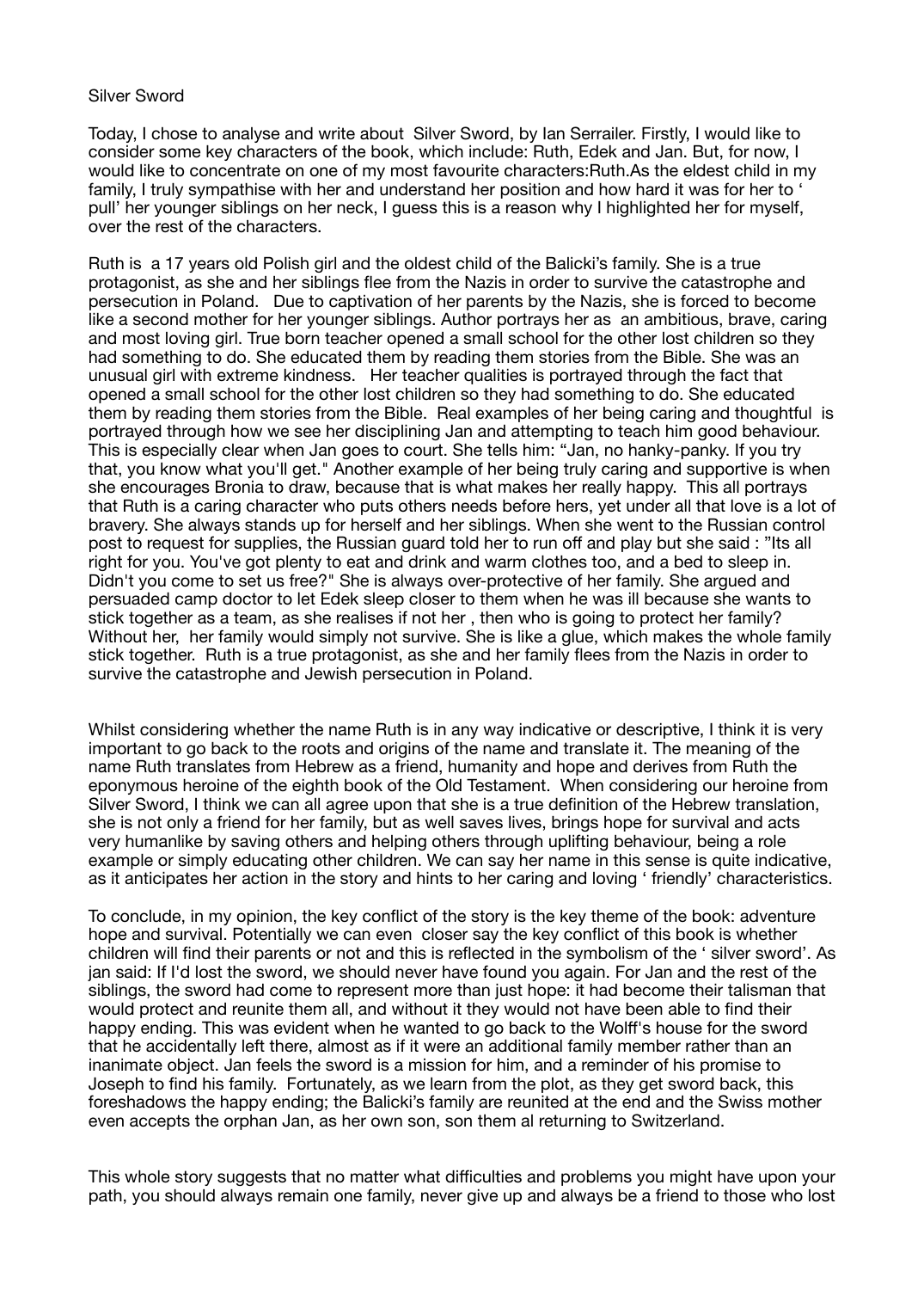silver sword
Publié le 29/04/2021

Extrait du document
«
Silver Sword
Today, I chose to analyse and write about Silver Sword, by Ian Serrailer.
Firstly, I would like to consider some key characters of the book, which include: Ruth, Edek and Jan.
But, for now, I would like to concentrate on one of my most favourite characters:Ruth.As the eldest child in my family, I truly sympathise with her and understand her position and how hard it was for her to Ô pullÕ her younger siblings on her neck, I guess this is a reason why I highlighted her for myself, over the rest of the characters.
Ruth is a 17 years old Polish girl and the oldest child of the BalickiÕs family.
She is a true protagonist, as she and her siblings ßee from the Nazis in order to survive the catastrophe and persecution in Poland.
Due to captivation of her parents by the Nazis, she is forced to become like a second mother for her younger siblings.
Author portrays her as an ambitious, brave, caring and most loving girl.
True born teacher opened a small school for the other lost children so they had something to do.
She educated them by reading them stories from the Bible.
She was an unusual girl with extreme kindness.
Her teacher qualities is portrayed through the fact that opened a small school for the other lost children so they had something to do.
She educated them by reading them stories from the Bible.
Real examples of her being caring and thoughtful is portrayed through how we see her disciplining Jan and attempting to teach him good behaviour.
This is especially clear when Jan goes to court.
She tells him: ÒJan, no hanky-panky.
If you try that, you know what you'll get." Another example of her being truly caring and supportive is when she encourages Bronia to draw, because that is what makes her really happy.
This all portrays that Ruth is a caring character who puts others needs before hers, yet under all that love is a lot of bravery.
She always stands up for herself and her siblings.
When she went to the Russian control post to request for supplies, the Russian guard told her to run off and play but she said : ÓIts all right for you.
You've got plenty to eat and drink and warm clothes too, and a bed to sleep in.
Didn't you come to set us free?" She is always over-protective of her family.
She argued and persuaded camp doctor to let Edek sleep closer to them when he was ill because she wants to stick together as a team, as she realises if not her , then who is going to protect her family? Without her, her family would simply not survive.
She is like a glue, which makes the whole family stick together.
Ruth is a true protagonist, as she and her family ßees from the Nazis in order to survive the catastrophe and Jewish persecution in Poland.
Whilst considering whether the name Ruth is in any way indicative or descriptive, I think it is very important to go back to the roots and origins of the name and translate it.
The meaning of the name Ruth translates from Hebrew as a friend, humanity and hope and derives from Ruth the eponymous heroine of the eighth book of the Old Testament.
When considering our heroine from Silver Sword, I think we can all agree upon that she is a true deÞnition of the Hebrew translation, she is not only a friend for her family, but as well saves lives, brings hope for survival and acts very humanlike by saving others and helping others through uplifting behaviour, being a role example or simply educating other children.
We can say her name in this sense is quite indicative, as it anticipates her action in the story and hints to her caring and loving Ô friendlyÕ characteristics.
To conclude, in my opinion, the key conßict of the story is the key theme of the book: adventure hope and survival.
Potentially we can even closer say the key conßict of this book is whether children will Þnd their parents or not and this is reßected in the symbolism of the Ô silver swordÕ.
As jan said: If I'd lost the sword, we should never have found you again.
For Jan and the rest of the siblings, the sword had come to represent more than just hope: it had become their talisman that would protect and reunite them all, and without it they would not have been able to Þnd their happy ending.
This was evident when he wanted to go back to the Wolff's house for the sword that he accidentally left there, almost as if it were an additional family member rather than an inanimate object.
Jan feels the sword is a mission for him, and a reminder of his promise to Joseph to Þnd his family.
Fortunately, as we learn from the plot, as they get sword back, this foreshadows the happy ending; the BalickiÕs family are reunited at the end and the Swiss mother even accepts the orphan Jan, as her own son, son them al returning to Switzerland.
This whole story suggests that no matter what difficulties and problems you might have upon your path, you should always remain one family, never give up and always be a friend to those who lost.
»
↓↓↓ APERÇU DU DOCUMENT ↓↓↓


